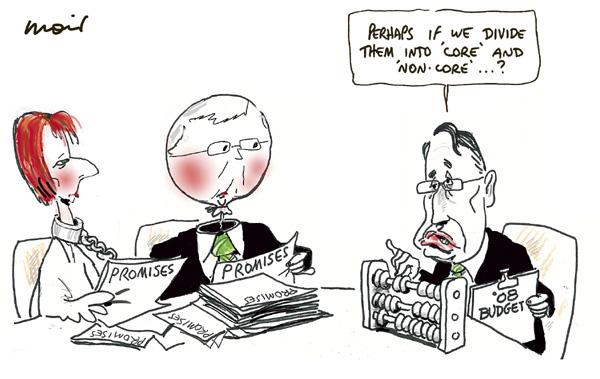|
December 19, 2007
The first Council of Australian Government's (CoAG) meeting under the new Rudd Government will be held this week in Melbourne on December 20. It will be the first CoAG meeting in which wall-to-wall Labor governments have sat down to hammer out a national reform agenda that died in the final years of the Howard Government.
It comes amid promises from the ALP that a new federal-state compact will be forged, leading to fundamental changes in the way Canberra and the states deliver services. Will this happen?

Alan Moir
The December CoAG meeting agenda focuses on health, education, climate change, housing , infrastructure and indigenous affairs. It promises to usher in an era of co-operative federalism. Co-operative federalism aims to to end what the ALP has called “the blame game” between the federal and provincial levels of government around health care. Can it be delivered?
It aims to do this through implementing Labor's election commitments on elective surgery waiting lists, the provision of aged care beds and a public dental program. These would constitute agenda item one for the commonwealth and the states and territories. However the states could not agree on an agenda and it has been entirely set by the Prime Minister.
I have not seen the point by point negotiating strategy contained in the high level policy papers, but the following information is in the public domain. It is stated that this COAG meeting will be more of a strategic discussion to outline a program of work for 2008, rather than aim to produce a policy agreement in these areas on day one.
Health care is the no I priority and it is understand thus:
1. The most immediate task is spend $100 million to remove the entire backlog of about 25,000 peoople who have spend longer on elective surgery waiting lists than the clinically recommended time.
Two strategies have been proposed to deal do this. First, surgical staff would be paid to conduct more operations outside normal hours---such as at night and over the weekend. And second, private hospitals would be contracted to help clear the backlog. Workforce problems are envisaged.
2. CoAG also needs to agree on how to implement the $300 million four year plan to provide competition policy-style dividend payments to the states to reward them for completing surgery within the clinically recommended time.
3. Another of CoAG's tasks is to set up the National Health and Hospitals Reform Commission. This body will set guidelines on how the performance of public hospitals can be judged.In the election Labor promised performance benchmarks for state and territory hospitals, and that if there is not improvement with 18 months, Rudd would propose constitutional referendum in 2010 giving the federal Government control of the nation’s 758 public hospitals.
4. The other issues are spending more on aged care, boosting dental programs and preventative care, as well as cutting out duplication. It is not clear what spending more on aged care and boosting preventative care means.
The latter seems to involve GP Super Clinics in different suburbs. Labor's GP Super Clinic funding means that GPs will be co-located with other primary care services to provide more convenient and accessible health care services. They are expected to include privately practising GPs, a range of allied health services such as physiotherapy and podiatry, mental health services including counselling; and dental services.
Ken Baxter, writing in the AFR, says that a key problem in delivering the reform agenda is the lack of capacity of the state ministers and their supporting departmental officials in key areas to lead the policy debates rather than protect the status quo. Victoria is the exception to the state's public services being depleted of rigorous policy people or becoming highly politicized. It is the commonwealth's public service that has retained the intellectual rigor that has declined in the states.
|
